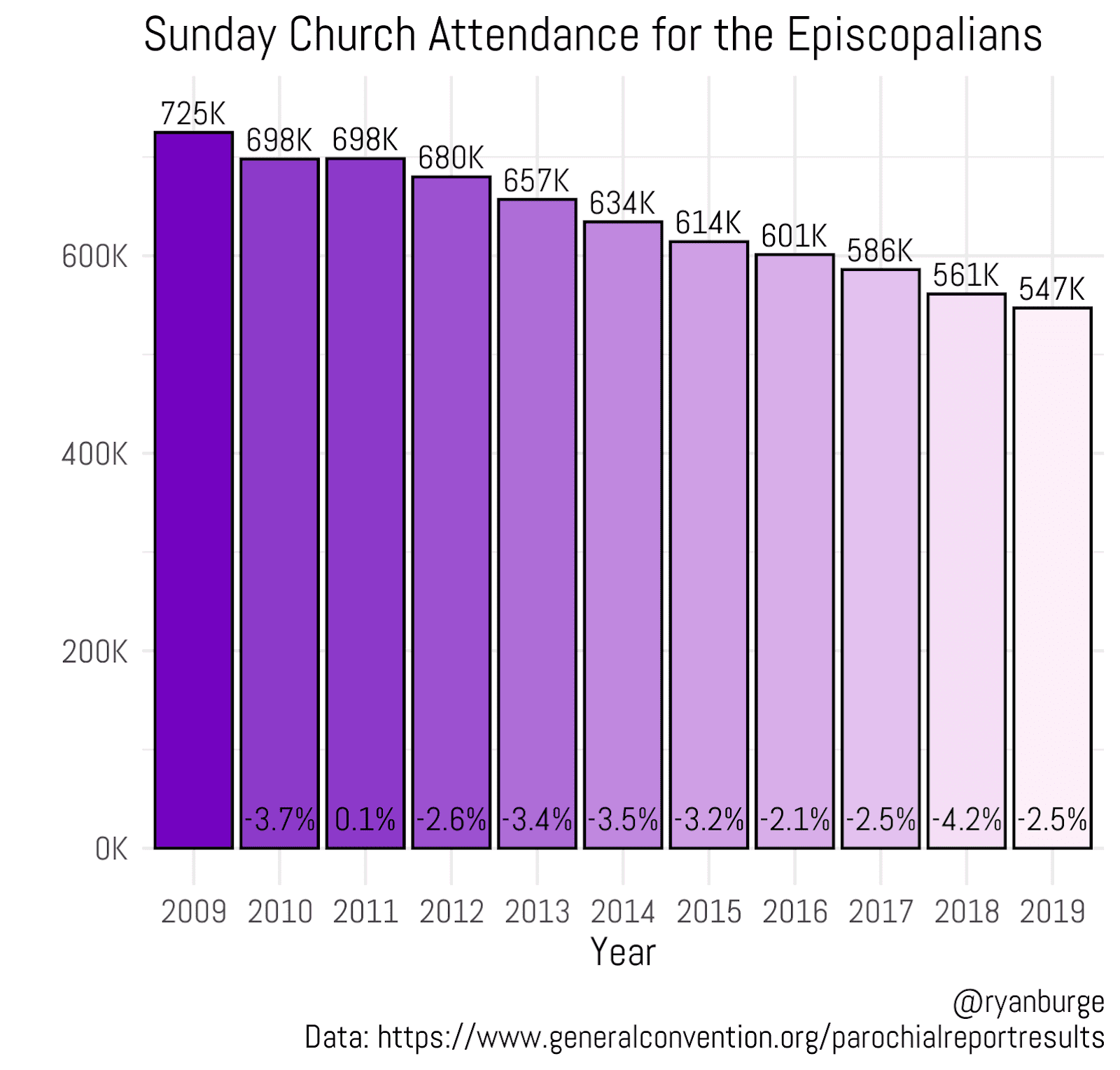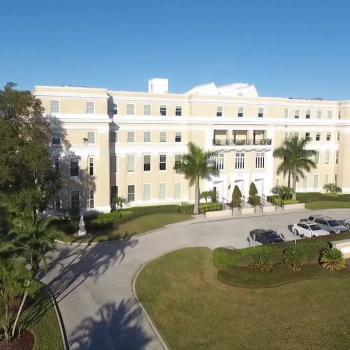The Episcopal Church is dying, says Professor Ryan P. Burge in a recent blog post on his site Religion In Public. Given that the average age of Episcopalians is old enough to be in the midst of retirement, it’s not a completely unreasonable theory. When the current generation dies, who will replace them? Are there enough young people to sustain the population?
It doesn’t help that attendance at Episcopal churches, based on their own membership reports, continues to decline:

What the denomination lacks in members, however, it makes up for in money, as older members have donated faithfully through the years. Some even left a portion of their estate to the church. The end result is that the Episcopal Church, as a whole, has still maintained its level of giving (including pledged amounts). But what good is a church with money if it has fewer and fewer members?
Burge writes:
Despite the fact that the coffers of the Episcopal Church are staying full through sustained donations from members, there is plenty of reason to be very concerned about the future of the denomination. In an article for Living Church, David Goodhew presented some numbers about weddings and baptisms occurring in the Episcopal Church that will be disheartening for members.
In 1980, the Episcopal Church reported 38,913 weddings. By 1990, that had dropped to 31,815. In 2019, that had declined again to just 6,148. Baptisms of children are only doing marginally better. In 1980, there were over 56,000 but by 2000 that dropped to 46,603. By 2019, that had declined by more than half to just 17,713. Using that data I project what both figures would look like in 2030, which is visualized in the figure below. According to the trend lines there will be no weddings in the Episcopal church in 2025. By 2030, the number of baptisms will drop to below 10,000 per year.
The implications for the Episcopalians are dire. Recall that the average Episcopalian is in their late sixties today, which means that the average attendance (which was about 550,000 in 2019) will likely be around 300,000 in 2030. That’s an average loss of 25,000 per year just through death. The church will be baptizing less than 10,000 infants per year. We know that retention for the mainline is just about 50% now, which means half those children who are baptized will eventually leave the church. When 25,000 people are leaving through death and only 5,000 are being replaced through children who stick around — the end is near. I don’t think that it’s an exaggeration at all to believe that the Episcopalians will no longer exist by 2040.
Even if you think it’s too pessimistic to think the entire church will die away in a matter of decades, the trend is clearly heading in the wrong direction for members of the church.
If you’re an atheist, perhaps you see that as a cause of celebration. But bear in mind that Episcopalians share many non-religious Americans’ progressive politics. More than two-thirds of them are liberal or moderate. 74% support same-sex marriage. They by and large favor affordable healthcare, welcoming refugees, fighting for social justice, and (above all) separation of church and state.
Like it or not, Episcopalians represent the spiritual and political leanings of many American Christians today, even if they do not identify as Episcopalian personally. This is a group that the non-religious can find common ground with — and unite with come election season. If any branch of American Christianity is on the decline, this is arguably not one atheists should be rooting for.
But from where I sit as an Anglican Christian, I don’t feel too afraid by Burge’s findings. For one thing, other recent studies have more optimistic findings. And even if more and more Christians are fed up with the rampant hypocrisy and abuse, especially in evangelical and Southern Baptist circles, ditching the label doesn’t necessarily mean they’re ditching the faith.
I myself flocked to the Anglican/Episcopal tradition for this reason. Fed up with celebrity pastor culture and a refusal to grapple with social issues, the Anglican/Episcopal church was a breath of fresh air for my weary soul. Is it perfect? No, of course not. The liturgical service also takes some getting used to. But I see the denomination being a refuge for more Christians as they realize that the powers that be in their current circles have no interest in changing their damaging ways.
This is good news for a society weakened by racism, poverty, and Christian Nationalism. The Episcopal church has a way of getting Christians to care about those things, and for that, atheists should be glad.
(Featured image via Shutterstock)




It’s Moving Day for the Friendly ..."
It’s Moving Day for the Friendly ..."
It’s Moving Day for the Friendly ..."
It’s Moving Day for the Friendly ..."